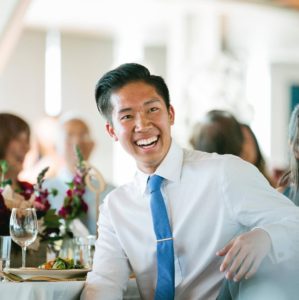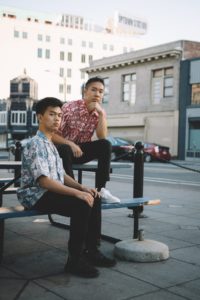Culture is not optional. It’s mando.

That’s the motto of a clothing brand co-founded by Andrew Pang, 24, who is by no measure a typical fashion entrepreneur. A full-time software engineer, he is currently traveling around South America as he works remotely while managing his company MANDO, which he launched in 2018 with his cousin Aaron Pang. When we caught up with him, he was in Buenos Aires, Argentina.
Pang’s experiences growing up as a Chinese American in the Bay Area inspired him to found MANDO Clothing with a vision for the brand to create clothes that represent the intersection of cultures that he and his cousin grew up in.
“It just stemmed out of our understanding of the struggle of growing up as Chinese American and being at a place now as adults where we can reclaim this pride for our heritage,” Pang said.
He hopes his brand, which includes a line of chic Mandarin collar shirts with calligraphy, will encourage others to also take pride in their multiple heritages. In fact, several of the shirt designs have already sold out, and the brand is steadily gaining attention on social media — @mandoclothing on Instagram and Facebook.
Below, the young entrepreneur discusses his thoughts on engaging in the creative field as an engineer and how Kendrick Lamar inspired MANDO’s name.
The following interview has been edited for length and clarity.
What was it like growing up as a Chinese American in the San Francisco Bay Area and how did that contribute to your co-founding of MANDO?
At home, my parents were very Chinese. Growing up, I would go to Chinatown with them every weekend or eat Chinese food. At the same time, there was the world around me. There’s school, the community, my friends, or the pop culture I was influenced by. Where hip-hop comes in … There’s a lot of people who are hip-hop fans of all races and I became one of them.
MANDO was a way for [Aaron and me] to create a brand that represented this intermingling of cultures and wanting to showcase the beauty of that and add to the conversation of appreciating cultures outside your own.
How did you come up with the word MANDO?
The original idea for clothing came from us wanting to utilize the Mandarin collar in a cool, modern way. I had travelled to Asia and gotten a couple shirts that have that collar. When I came back [to the U.S.] and wore them, people would always say, “Oh, that shirt’s so dope. That’s the Asian collar, right?”
A big reason for us to get into this whole thing was not seeing enough media that Asian people or things were really dope in. So, we’re shortening the word “Mandarin collar,” but also having that double meaning and part to it that sounded cool. Kendrick Lamar uses Mando as slang — it’s short for “mandatory,” and it’s in some of his songs. The message we wanted to get across was “bold” and how we think that these things are “mandope.” This appreciation of culture is mando.
Is Kendrick Lamar someone you look up to?
Definitely. He’s been one of my favorite rappers for a while.
What’s your favorite album by him?
“To Pimp a Butterfly.”
MANDO came out with a line this summer that paired Indonesian Batik fabrics with your Mandarin collar shirts. How did you go about launching that line?
We collaborated with this really cool Indonesian photographer, Elizabeth Wirija … to create a campaign around this cool traditional style called Batik, which is really popular in Indonesia … It’s this idea of bringing that to this American audience through the lens of someone from that culture.
Tell us about your educational and career path and how you got to be a full-time software engineer who also has his own clothing brand.
In college, I studied computer science, which leads to being a software engineer … Computer science was a potential good option for someone who wanted to be an entrepreneur because they could create something of their own.

I got a good job in the Bay Area in San Francisco out of college and while at that job, my cousin and I were talking about the state of times we were in, which was about two and a half years ago, So, you can imagine Trump just being elected. We examined our own upbringings and explored our own identities more at the time … All of these things led to a passion project that became MANDO.
Could you elaborate on how and why you came to think more about your identity during the period where President Trump got elected?
It was a thing of the time. Though you could say it’s still ongoing, I have heard of quite a few stories of people at the time who wanted to do something to field their feelings, whether it was anger or sadness, into action. A lot of people did things and expressed themselves in different ways, whether it was art or a business like ours.
What sort of setting helps you get your creative juices flowing?
Sometimes, I feel like being at home and working late at night is when I can get in the flow. It’s a moment in time where I’m like, “I don’t have anything to do, I can’t procrastinate more and all I’m doing is this.”
What’s the best life advice you’ve received?
Probably variants of people advising me to travel. When I was in college, I studied abroad in Singapore, and I think that was a great experience that taught me to see the world outside the bubble we’re in and our homes in America. It was part of the journey in reclaiming my pride for being Chinese and in some way, that influenced what would become MANDO.
What are some other places you want to visit?
Now that I’m here in Buenos Aires, I’m going to go to a couple of other countries in South America. One of the places that I’m interested in is Peru because it has the largest [percentage of] Chinese in South America, and the Chinese and Japanese there heavily influence the [local] cuisine … I hope to learn more about how these different influences got into Peruvian food.
What’s some advice you would give your 15-year-old self?
Don’t pitch yourself based off labels or titles. This especially happens in school and the corporate world where you have to go up the ladder to ‘make it.’ We are given these titles of what your major is and what type of student you are or what you’re smart at. That immediately boxes people into saying “I can do this because I’m that, but not this because I’m not that,” which I think is limiting when it comes to the multitude of things you could have also been getting good at.